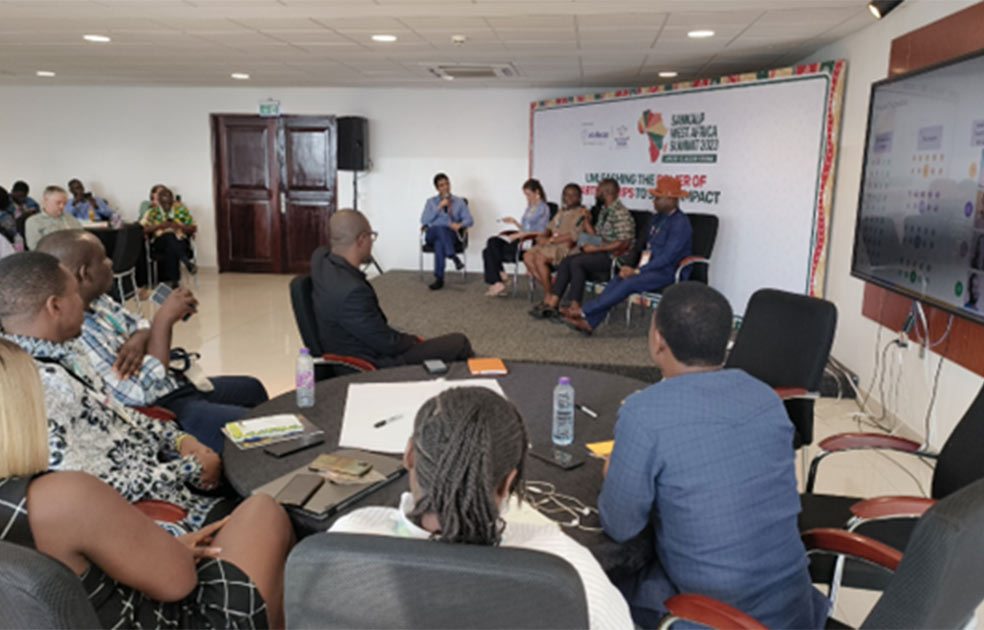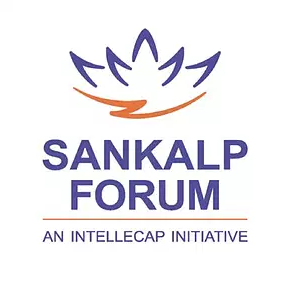

The investment potential for Africa’s Circular Economy (CE) stands at a colossal $3 trillion. However, the region faces a loss of $7.6 billion in recoverable resources annually, according to Opeyemi Oriniowo, the Policy Adviser – Economic Affairs at the Consulate General of the Kingdom of Netherlands. Opeyemi revealed these alarming figures during his keynote speech at the Sankalp West Africa 2023 summit’s workshop titled “Circular Road Mapping for Western Africa: Let’s Generate Actionable Solutions”.
Given the extensive CE potential in the region, it’s vital to consolidate key stakeholders and instigate collective action. Therefore, Intellecap’s Circular Apparel Innovation Factory (CAIF) convened participants from various sectors in a workshop that followed a co-creation methodology. This approach facilitated a comprehensive understanding of the present situation, the challenges in creating a circular ecosystem, and the roadmap towards collective action.
Siddharth Lulla, Principal at Intellecap, spearheaded the workshop as a significant part of the Sankalp West Africa summit. Prominent industry practitioners and entrepreneurs Kelechi Ofoegbu (Impact Hub, Accra), Tolulope Omoyeni (CEIP), Joanna Bingham (Footprints Africa), and Venan A. Sondo (Chaint Afrique) joined the discussion, contributing valuable insights based on their specific expertise.
Key Insights from the Experts and Practitioners included:
Current State of Affairs: During brainstorming sessions, several existing CE practices, such as coconut shell reuse, water sachet and metal scrap recycling, and conversion of agricultural waste into insect proteins, were highlighted. The plastics, e-waste, agro-processing, textiles, and construction industries were pinpointed as having the highest potential for CE transition. Joanna insightfully stated, “Circularity may seem like a new concept, but it’s ingrained in most regional communities.”
The workshop also highlighted the formation of Africa’s institutional framework for the CE, with Ghana and Nigeria joining the Global Plastic Action Partnership, the creation of the African Circular Economy Alliance (ACEA) by South Africa, Nigeria, and Rwanda, and the African Union and AMCEN developing the African Circular Economy Action Plan.
Gaps and Challenges: Key hurdles to harnessing CE’s regional potential included a lack of awareness about the CE benefits among stakeholders, a shortage of CE best practices know-how among the workforce, and an absence of vital infrastructure such as waste collection points and recycling stations. Furthermore, the need for a supportive policy framework to encourage capacity building and private sector investments was noted.
Roadmap for Collective Action: Tolulope emphasized, “There’s a need for appropriate advocacy and engagements across all levels for CE in Africa.” This echoed the workshop’s collective action recommendations, which were grouped into several critical areas, including:
- Awareness Building: Conducting workshops and town hall discussions to promote awareness among stakeholders, encourage efficient waste disposal behaviour, and bridge the communication gap between policymakers and the public.
- Enabling Policy Framework: Incorporating policies such as Extended Producer Responsibility (EPR) to fund necessary waste management and recycling infrastructure, taxing polluting industries to supplement public subsidies for circular manufacturing.
- Workforce Capacity Development: Integrating CE principles into education curricula and developing tailored vocational programs in partnership with the industry.
- Circular Technology Access: Increasing R&D spending, promoting technology-sharing arrangements with industrialized nations, and developing regional accelerator programs to support technology and circular solutions.
- System-Level Initiatives: Incorporating accountability and traceability into decision-making processes and enabling widespread digital access and long-term management of digital equipment.
Alongside these actions, the collective underscored the necessity of system-level changes, like incorporating accountability into decision-making processes and facilitating widespread digital access.
By steadfastly pursuing these strategies post-workshop, Intellecap, industry leaders, and participants are committed to unlocking West Africa’s rich, yet untapped potential in the circular economy. Join us as we journey towards a more sustainable and economically vibrant future.
By
Siddharth Lulla, Principal, Intellecap
Ashok Thanikonda, Manager, Intellecap




